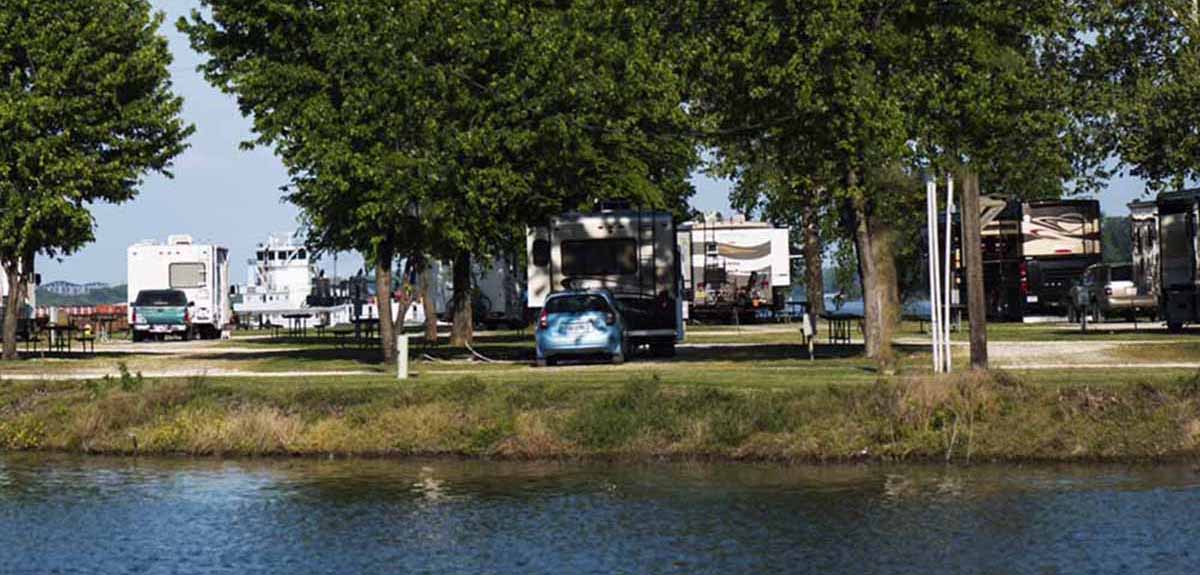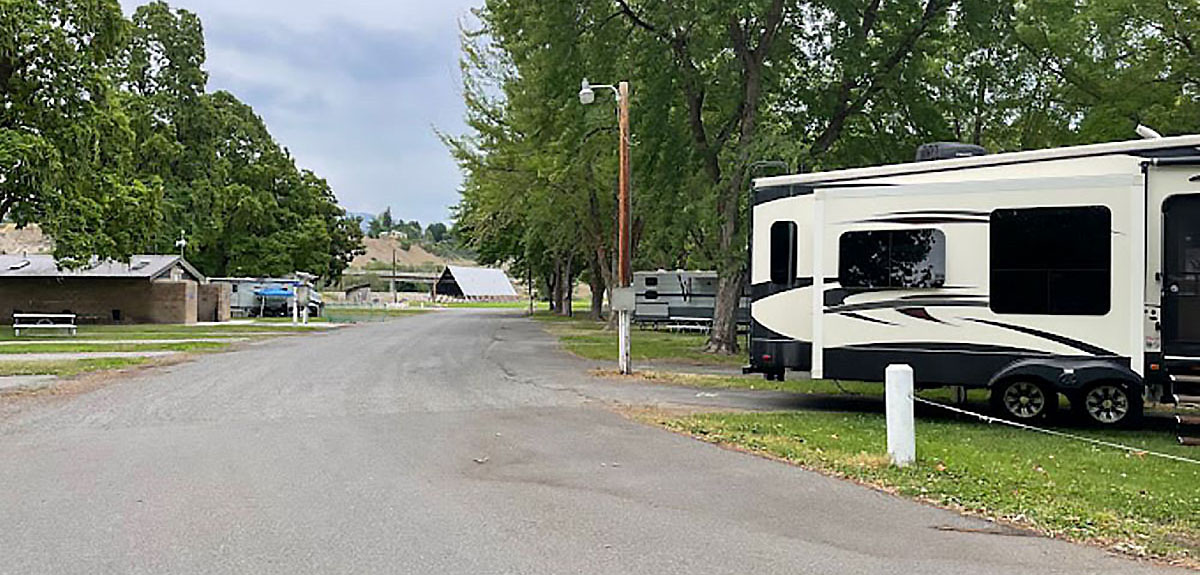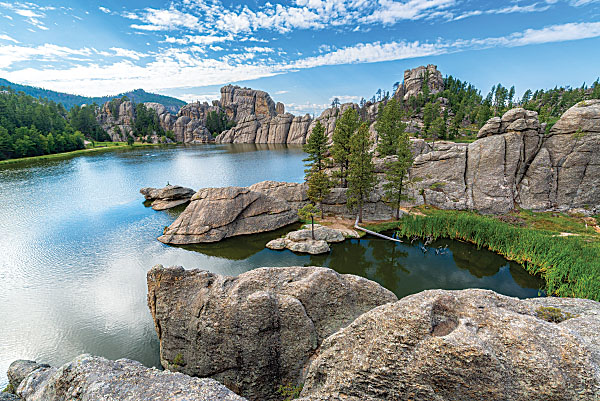5 Things You Should Know Before Becoming A Full-Time RVer
Image Caption:
In just the last few years, terms like “Tiny Living,” “Van Life” and “Digital Nomad” have swept into the public vocabulary. A quick Google search for any of these will yield millions of results and a wide range of lifestyles that trade the traditional, location-centered existence for the excitement and freedom of life on the road. As the lexicon expands, and awareness of these lifestyles grows, more and more people are making the jump. I am one of those people.
It was just two years ago that my girlfriend, Leah, and I decided to make the jump into a full-time RV lifestyle. A few months later, we had bought our 35-foot class A and began the renovation. Approximately five months later, our house was rented, and we were living on The Rambler full time. It’s been a huge change, and we’ve learned a lot during the transition. It’s been very rewarding, but it’s also had some challenges. If you’re considering a similar lifestyle, below are five things you should know before becoming a full-time RVer.
1. Absorb Everything You Can About RV Life
As far as decisions go, this is a big one. For myself, it’s probably one of the biggest decisions I’ve made in my life. I think of myself as a planner and I love to know as much as I can before making any decision. The transition to the RV life was no different. I spent months online, watching videos and reading blogs and articles about RVs and the lifestyle. I had dozens of conversations with people in my sphere about their RV experiences. I went to look at several RVs and asked as many questions as I could think to.
Obviously, it’s impossible to know everything, and we’re no experts, but through all that research, we learned a lot. It kept us from making some big mistakes. In our eagerness to buy an RV with a budget in mind, and knowing we were going to renovate, we looked at several fixer-uppers. But after seeing how much work was required to fix water damage in online videos, we made sure to limit our search for RVs only needing cosmetic updates. It also made certain decisions much easier. How else would you know you wanted a compost toilet until you experienced the dreaded Black Water Tank Dump?
If there’s one thing I can’t stress enough, it’s to do as much research as you can before making the switch to live in an RV full time. There are many online resources, such as blogs, video channels and social media groups dedicated to full-time RVing. And Motorhome’s RV Tech Q&A is fantastic. These can be a huge help in the transition. Ask your friends about their RVs. Rent or borrow an RV for a few days and try it on for size. You may realize that it’s not for you. Or, like us, you may realize you’ll love it!
2. Things Will Go Wrong.
While you can learn a lot before becoming a full-time RVer and try to anticipate any challenges or casualties that may come up, something will eventually go wrong. You will make mistakes. Things will break. It’s just that simple.
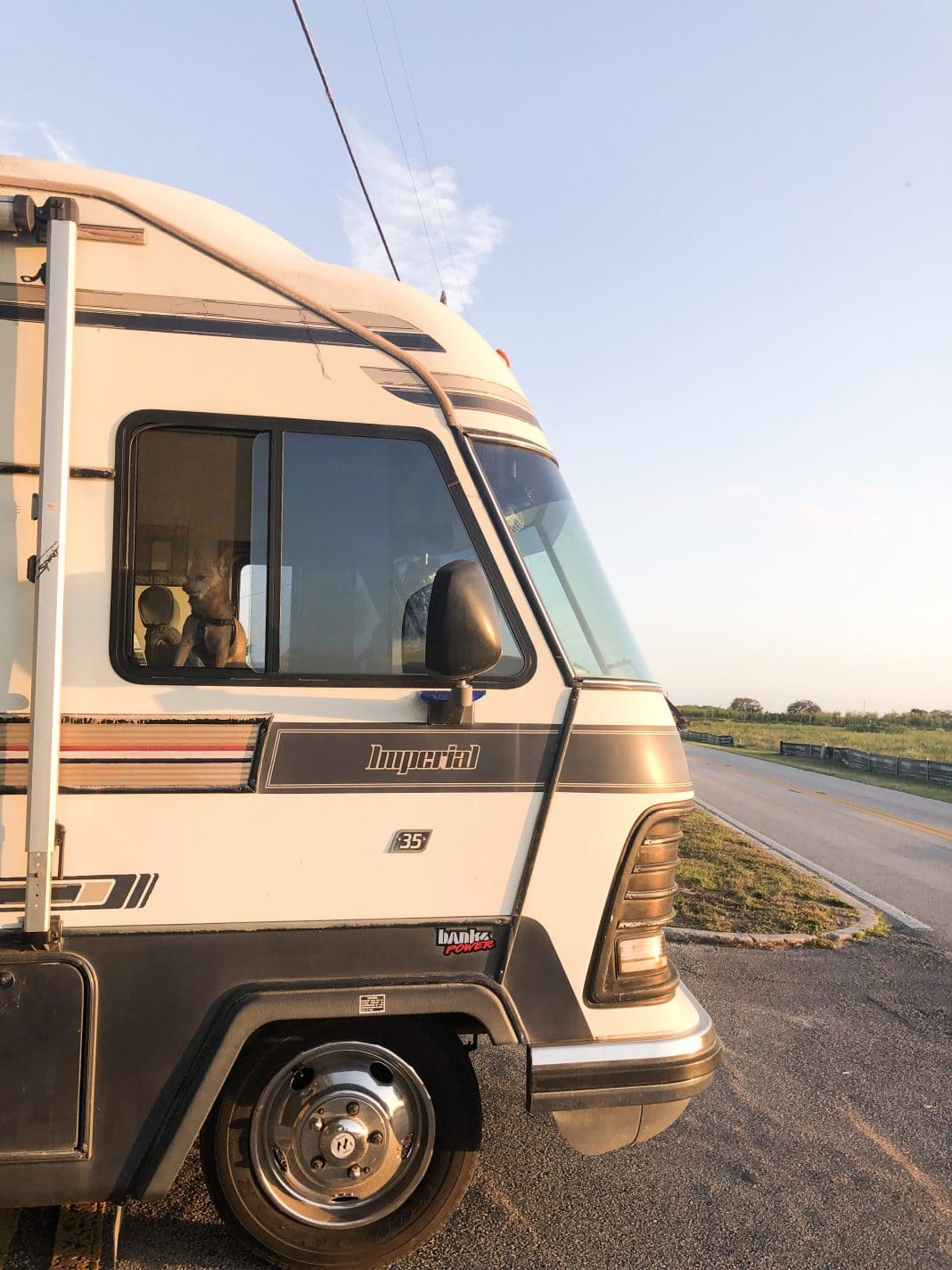
Photo Credit: Leah Young
I like to think of myself as pretty handy. I’ve worked on my own vehicles since my teens. I’ve remodeled kitchens and baths. There aren’t many messes that come up that I feel I can’t tinker my way out of, so I feel pretty comfortable with the idea of buying and renovating an older RV. What could go wrong, right? Well, within two hours of buying our vehicle, I had buried it in 12 inches of mud in my brother’s yard — where we kept the RV while we renovated. The next day I overheated the engine trying to climb my way out of the mud. Then, I burned up the 30-year-old starter trying to start it again too soon after overheating. As far as mistakes go, this one wasn’t too bad. A quick call to my insurance company and a tow truck was dispatched to pull us out of the mud. A few hours and less than $100 later, and I had replaced the starter and we were mobile again. In the end, we only lost a day from our renovation schedule.
That’s the real lesson here. Inevitably, something will go wrong. It’s how you handle it that makes the difference. I knew something would go wrong and I moved on to the solution. I did what I could on my own and got help with what I couldn’t manage. Things will go wrong. As the Beatles said, “Ob-La-Di, Ob-La-Da!”
3. You’re Not Crazy
Despite what many of your friends and family members will tell you, you’re not nuts for choosing to become a full-time RVer. At least, I don’t think we are. When we started discussing the possibility of making the jump, many of our loved-ones offered words of encouragement, even envy. Still, even more people offered words of concern and unease. Here are a few of their concerns:
“WHAT ABOUT YOUR JOBS?”
“WHAT ABOUT YOUR HOUSE?”
“IT’S SO SMALL!”
“WHAT ABOUT ALL YOUR THINGS?”
All the expected nail-biting and hand-wringing.
Some folks may never get the appeal of this lifestyle, and that’s OK. Even now, after months in our RV, we still receive some anxious comments or worried looks. We assure them we’re happy, and that’s the best we can do. Don’t worry too much about what other people think and follow your own path — maybe with a little help from GPS.
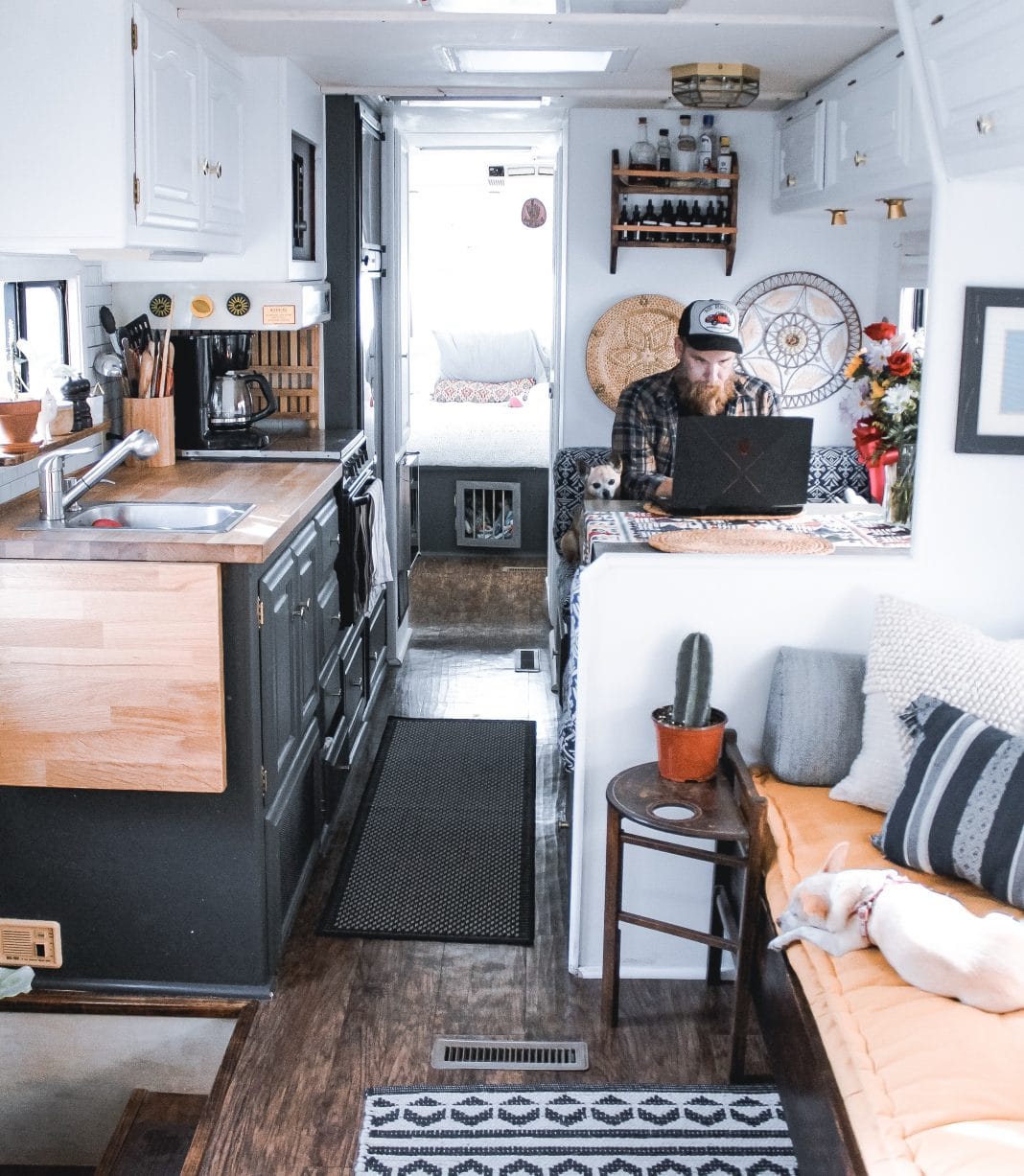
Brennan working inside the “Rambler.” Photo Credit: Leah Young
4. This Is Home
The traditional RV is not really intended for long-term living. Many of the system components like black- and gray-water tanks, battery banks and fuel tanks are designed for a limited time in use. It seems evident that the designers and fabricators of RVs were thinking in days or weeks, not months or years, for most models. That said, this goes for interior design as well. Most RVs come with the standard; somewhat utilitarian, interior aesthetic suited for the temporary stay away from home. But what about when the RV is your home?
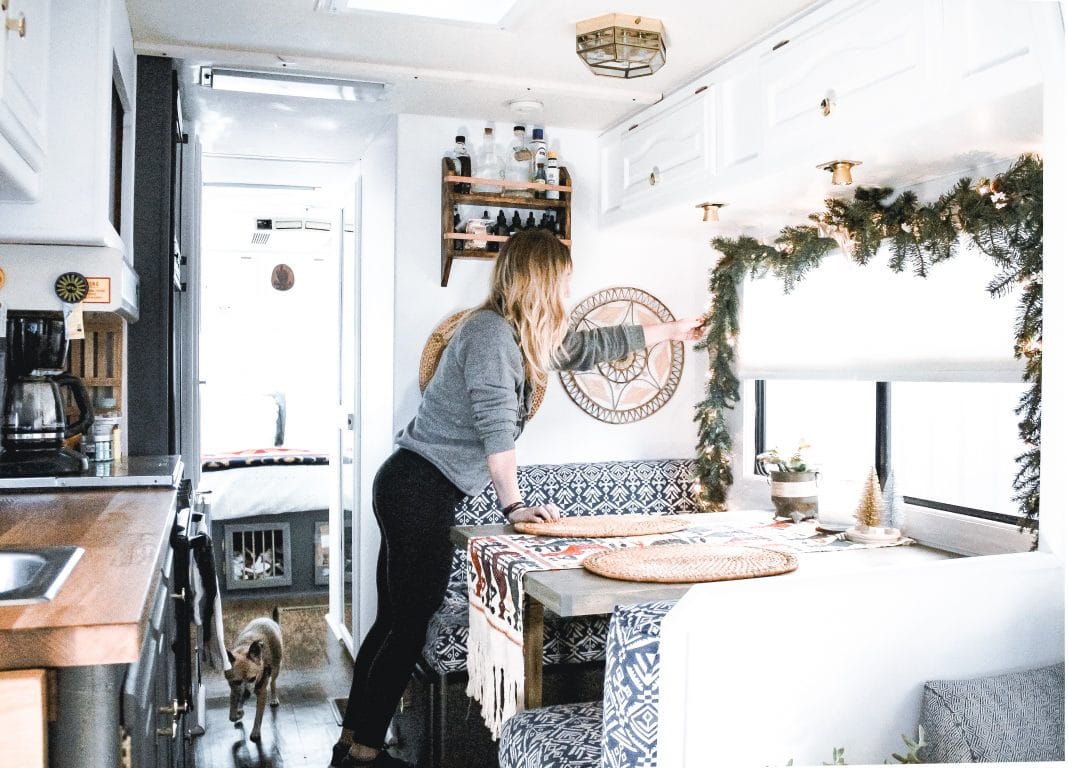
Make your home on wheels your home. Photo Credit: Leah Young
Downsizing will, of course, come with its limits. Perhaps your grandmother’s fine china or that tuxedo you’ve worn once in that last decade may find themselves in storage or the bag marked, “Goodwill.” However, when transitioning to full-time RVing, we believe making your new home feel as much like “home” as possible is very important. This is why we renovated the Rambler and included many of our favorite art pieces from our house. It’s why I built a custom console for our turntable and records. These were the things that made our house feel like home and they remain the things that make our RV feel like home. Remember: This is Home! Make it feel that way.
5. Have Fun!
This is probably the most important thing you can know before becoming a full-time RVer. Have fun! That’s what this lifestyle is all about. Nothing makes life more enjoyable than new experiences, and the full-time RVing lifestyle can make this a daily occurrence. Waking up in a new location each morning can make each day brim with exciting possibilities. The morning coffee run can turn into an adventure. The afternoon dog walk is an opportunity to see something you’ve never seen before. Even the typical work day, looking out the window at your new parking spot can make the most mundane of chores completely enjoyable.
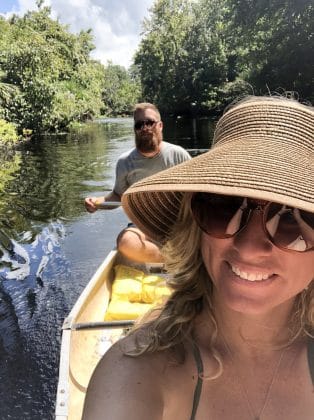
Explore the areas you visit and don’t forget to have fun. Photo Credit: Leah Young
Becoming a full-time RVer can have its challenges, to be certain. However, the freedom and opportunity this lifestyle can afford are boundless. We’ve loved every minute. If you do decide to make the jump like we did, remember, have fun and enjoy the ride! We’ll see you on the road!

